The Substation Automation and Integration Market is estimated to be valued at USD 44.1 billion in 2025 and is projected to reach USD 71.8 billion by 2035, registering a compound annual growth rate (CAGR) of 5.0% over the forecast period. During the early adoption phase from 2020 to 2024, the market grows gradually, increasing from USD 34.6 billion to around USD 42.0 billion. This period is characterized by the initial uptake of automation technologies by forward-looking utilities and industrial players, focusing on pilot projects, niche applications, and technological experimentation.
Investments in smart grid infrastructure and regulatory incentives play a significant role in fostering early market traction. From 2025 to 2030, the market enters the scaling phase, expanding from USD 44.1 billion to approximately USD 56.3 billion. Adoption accelerates as more utilities and industrial entities recognize the benefits of automated substation management, such as improved operational efficiency, reduced downtime, and enhanced grid reliability. Vendors increase production capacity, enhance solution offerings, and invest in customer support, while regional adoption widens, driving a steady CAGR of 5.0%. Between 2030 and 2035, the market transitions to consolidation, reaching USD 71.8 billion. Growth moderates as the market matures and major players dominate, standardizing technologies and solutions. Competitive differentiation is shifting to services, integration expertise, and advanced analytics, while mergers and acquisitions are reshaping market structure. Incremental innovation and operational efficiency define the competitive edge during this phase.
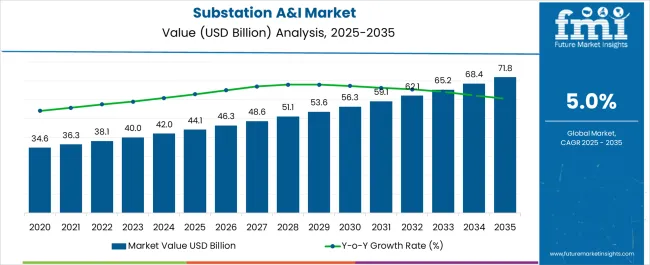
| Metric | Value |
|---|---|
| Substation Automation and Integration Market Estimated Value in (2025 E) | USD 44.1 billion |
| Substation Automation and Integration Market Forecast Value in (2035 F) | USD 71.8 billion |
| Forecast CAGR (2025 to 2035) | 5.0% |
The substation automation and integration market is expanding steadily due to rising energy demand, grid modernization initiatives, and increased focus on operational efficiency and system reliability. Utilities and grid operators are deploying intelligent electronic devices, communication networks, and data analytics to enhance monitoring, control, and protection of substations.
The transition toward digital substations, combined with aging grid infrastructure in several developed regions, is creating significant demand for automation solutions. Moreover, renewable energy integration and decentralized generation require more responsive and adaptive substations.
Governments and regulatory bodies are supporting automation initiatives through policy frameworks and investment programs, particularly in transmission infrastructure. The market outlook remains strong as substation automation becomes essential for real time data visibility, fault detection, and remote operations in increasingly complex energy ecosystems.
The substation automation and integration market is segmented by offering, type, installation type, end-user industry, component, communication technology, and geographic region. By offering, the substation automation and integration market is divided into Hardware, Software, and Services. In terms of type, the substation automation and integration market is classified into Transmission substations and Distribution substations. Based on the installation type, the substation automation and integration market is segmented into New installations and Retrofit installations.
By end-user industry, the substation automation and integration market is segmented into Utilities, Steel, Oil & gas, Mining, Transportation, and Others. By component, the substation automation and integration market is segmented into IEDs, Communication networks, and SCADA systems. By communication, the substation automation and integration market is segmented into Ethernet, Power line communication, Copper wire communication, and Optical fiber communication. Regionally, the substation automation and integration industry is classified into North America, Latin America, Western Europe, Eastern Europe, Balkan & Baltic Countries, Russia & Belarus, Central Asia, East Asia, South Asia & Pacific, and the Middle East & Africa.
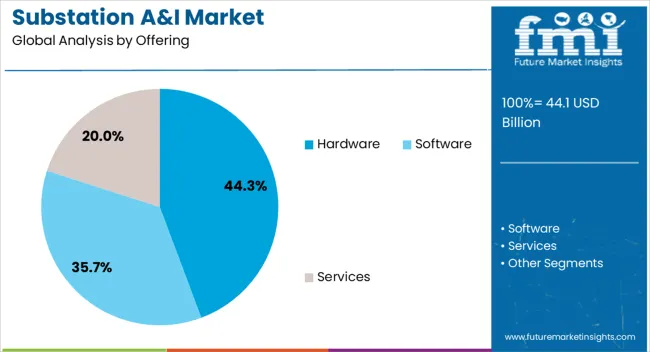
The hardware segment is projected to account for 44.30% of the total market revenue by 2025 within the offering category, positioning it as the leading segment. This is due to the critical role of physical components such as remote terminal units, intelligent electronic devices, protection relays, and communication infrastructure in enabling automated substation functionality.
Hardware investments have been prioritized as utilities focus on upgrading legacy systems with smart and connected components that ensure higher reliability and faster fault response. Additionally, hardware forms the foundation for digital control, real time monitoring, and efficient power flow management.
With growing emphasis on scalable and interoperable solutions, the hardware segment continues to lead as a core enabler of automated and integrated substation operations.
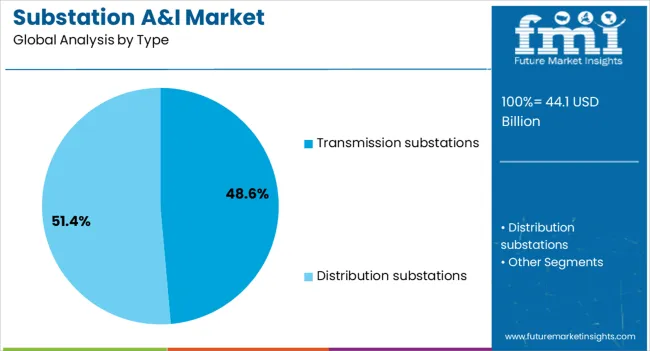
The transmission substation segment is expected to account for 48.60% of the total revenue by 2025 within the type category, emerging as the most dominant substation type. This share is driven by the increasing complexity of high voltage transmission networks and the need for real-time operational control, load management, and fault isolation.
Transmission substations are pivotal in long distance power flow and interconnection of power generation sources, making their automation vital for grid stability. As demand for reliable and uninterrupted power grows across industrial and urban zones, utilities are investing in advanced automation solutions to modernize transmission infrastructure.
This focus has elevated transmission substations as the preferred choice for automation deployment.
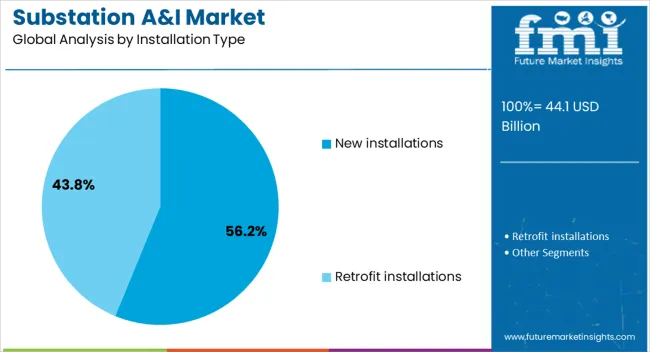
The new installation segment is expected to capture 56.20% of the market by 2025 within the installation type category, making it the most significant segment. This growth is attributed to global investments in greenfield energy infrastructure projects, grid expansion efforts, and the development of smart cities and renewable energy corridors.
New substations are being designed with built-in automation capabilities to support digital grid strategies and enable seamless integration with modern SCADA and communication systems. The lower lifecycle cost and flexibility of automated systems in new builds make them more attractive compared to retrofitting older infrastructure.
As a result, new installations continue to dominate due to their alignment with long-term modernization and energy transition goals.
The substation automation and integration market is witnessing robust growth driven by rising demand for reliable, efficient, and intelligent power distribution networks. Utilities are increasingly adopting automation technologies to enhance monitoring, control, and protection of electrical substations, improving grid reliability and reducing downtime. Integration of IoT, SCADA systems, and advanced communication protocols enables real-time data acquisition, predictive maintenance, and remote operations. Growth is further supported by the global push for smart grids, renewable energy integration, and digital transformation in energy infrastructure. Market players focus on standardized solutions, cybersecurity, and interoperability to meet utility requirements. Developed regions like North America and Europe lead adoption, while emerging economies in Asia-Pacific and the Middle East offer high growth potential due to expanding power networks and modernization initiatives.
Substation automation involves integrating diverse systems, devices, and communication protocols, creating significant technical complexity. Utilities often operate equipment from multiple vendors with different standards, making seamless interoperability difficult. Legacy systems may lack compatibility with modern automation technologies, requiring costly upgrades or complete overhauls. Engineers must ensure synchronized communication between relays, controllers, and SCADA systems while maintaining system reliability and cybersecurity. Integration projects demand detailed planning, skilled personnel, and rigorous testing to avoid operational disruptions. Interoperability standards like IEC 61850 help, but regional variations and proprietary solutions can slow deployment. Companies providing standardized, modular, and easily scalable automation solutions with extensive integration support gain a competitive edge. Until harmonized global standards are widely implemented, integration complexity will remain a key challenge for utilities seeking efficient substation automation.
Technological innovation is crucial to the adoption of substation automation. Advanced communication protocols, smart sensors, and real-time monitoring devices enhance data acquisition and predictive maintenance capabilities. The integration of artificial intelligence and machine learning enables automated fault detection, load balancing, and energy optimization, thereby reducing downtime and operational costs. Digital twins and simulation platforms allow utilities to model system behavior, test upgrades, and plan maintenance efficiently. Cybersecurity solutions ensure protection against digital threats, while modular automation platforms simplify future expansions. Companies that leverage these innovations provide high-value solutions, improving grid resilience and operational efficiency. As the energy sector transitions toward smart grids and renewable energy integration, technology-driven automation becomes increasingly crucial for utilities seeking to modernize their infrastructure and optimize performance.
The substation automation market is strongly influenced by regulatory standards and compliance requirements. Utilities must adhere to grid reliability, safety, and cybersecurity standards set by local authorities, regional power commissions, and international bodies such as IEC and IEEE. Policies promoting smart grid deployment and renewable energy integration further drive automation adoption. Non-compliance with regulations can result in operational penalties, safety risks, and reduced reliability. Utilities must ensure accurate reporting, monitoring, and maintenance practices to meet regulatory expectations. Vendors providing compliant solutions with validated cybersecurity measures, interoperability, and adherence to standard protocols gain trust from utilities. Until globally harmonized regulations emerge, companies must navigate diverse regional frameworks while maintaining safe, reliable, and efficient substation automation systems.
Competition in the substation automation market is intensifying as established multinational suppliers face pressure from regional and specialized technology providers. Vendors compete on system reliability, integration capability, advanced analytics, cybersecurity, and after-sales support. Supply chain stability for electronic components, communication modules, and sensor devices is critical to meet project timelines. Geopolitical tensions, semiconductor shortages, and logistical challenges can affect delivery schedules and costs. Companies investing in local manufacturing, strategic sourcing, and partnerships with utility firms enhance supply chain resilience. Differentiation is increasingly achieved through modular platforms, digital service offerings, and tailored integration solutions. Until supply chain robustness and technology standardization improve, competitive advantage will depend on a combination of innovation, reliability, and service excellence in substation automation projects.
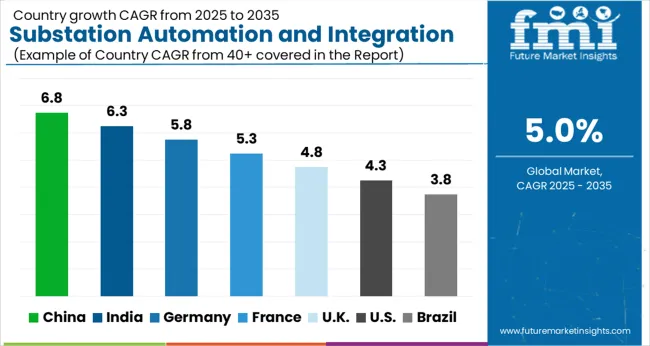
| Countries | CAGR |
|---|---|
| China | 6.8% |
| India | 6.3% |
| Germany | 5.8% |
| France | 5.3% |
| UK | 4.8% |
| USA | 4.3% |
| Brazil | 3.8% |
The global Substation Automation and Integration Market is projected to grow at a CAGR of 5.0% through 2035, supported by increasing demand across power transmission, distribution, and monitoring applications. Among BRICS nations, China has been recorded with 6.8% growth, driven by large-scale deployment and integration in electrical substations, while India has been observed at 6.3%, supported by rising adoption in power distribution and grid management. In the OECD region, Germany has been measured at 5.8%, and France at 5.3%, where production and deployment for substation automation and grid applications have been steadily maintained. The United Kingdom has been noted at 4.8%, reflecting consistent utilization in power monitoring systems, while the USA has been recorded at 4.3%, with production and integration across transmission and distribution networks being steadily increased. This report includes insights on 40+ countries; the top five markets are shown here for reference.
The substation automation and integration market in China is growing at a CAGR of 6.8%, driven by rapid urbanization, expansion of the power grid, and renewable energy integration. Utilities are increasingly adopting automated solutions for real-time monitoring, fault detection, and efficient energy distribution. Technological advancements, such as smart grid technologies, IoT-enabled monitoring systems, and advanced communication protocols, are enhancing operational efficiency. Government initiatives promoting grid modernization, energy efficiency, and renewable energy integration further support market growth. China’s focus on sustainable energy solutions, coupled with investments in transmission and distribution infrastructure, accelerates the adoption of substation automation systems. Utilities across the country are upgrading existing substations to automated solutions, improving reliability, safety, and energy management capabilities.
Substation automation and integration market in India is expanding at a CAGR of 6.3%, driven by growing power demand and modernization of the electrical grid. Automated substations improve reliability, efficiency, and fault management in transmission and distribution networks. Technological innovations, including digital relays, SCADA systems, and IoT-enabled devices, enhance real-time monitoring and predictive maintenance capabilities. Government programs promoting smart grid implementation, renewable energy integration, and rural electrification fuel market growth. Power utilities and private energy companies increasingly deploy automated solutions to optimize energy management and reduce downtime. As India continues to strengthen its power infrastructure and integrate renewable energy sources, the substation automation market is poised for sustained expansion.
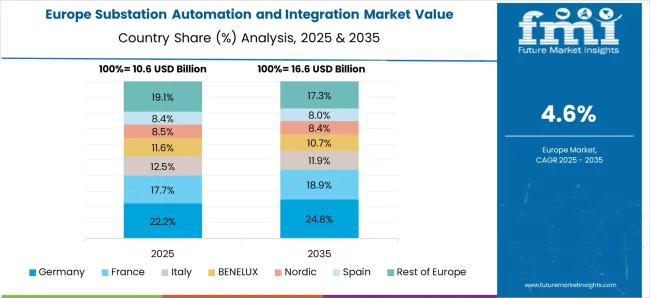
Germany’s substation automation and integration market is growing at a CAGR of 5.8%, driven by industrial electrification, renewable energy adoption, and smart grid initiatives. Automated substations enhance power reliability, reduce operational costs, and improve grid safety. Advanced technologies, including digital transformers, communication protocols, and energy management software, support real-time monitoring and efficient distribution. Germany’s focus on energy transition, renewable integration, and industrial efficiency drives consistent demand for automated substation solutions. Utilities and industrial operators are upgrading existing infrastructure to ensure operational resilience, reduce outages, and support sustainable energy deployment. The market benefits from strong regulatory frameworks emphasizing energy efficiency, automation, and safety compliance.
The UK substation automation and integration market is growing at a CAGR of 4.8%, driven by modernization of power infrastructure and renewable energy integration. Automated substations improve reliability, safety, and energy management for utilities and industrial users. Technological advancements, including SCADA systems, digital relays, and real-time monitoring tools, enhance operational efficiency. Government policies emphasizing smart grids, carbon reduction, and sustainable energy support market growth. Deployment in transmission and distribution networks ensures optimized energy flow, reduced outages, and improved maintenance capabilities. The UK’s focus on upgrading legacy systems and integrating renewable energy continues to drive the adoption of substation automation solutions.
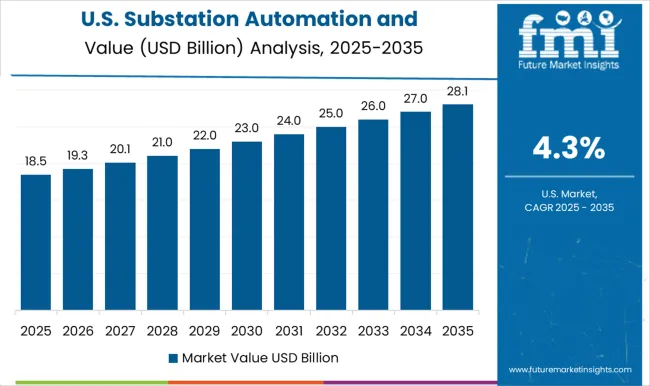
The substation automation and integration market in the USA is expanding at a CAGR of 4.3%, supported by modernization of aging electrical infrastructure and renewable energy integration. Automated substations enable real-time monitoring, rapid fault detection, and efficient energy distribution. Technological innovations, such as IoT-enabled devices, SCADA systems, and advanced communication protocols, improve operational reliability and reduce maintenance costs. Federal and state initiatives promoting smart grid implementation, energy efficiency, and clean energy adoption fuel market growth. Utilities, industrial operators, and transmission companies are increasingly upgrading traditional substations to automated solutions, ensuring safety, sustainability, and operational resilience. Continuous investments in grid modernization, renewable integration, and advanced monitoring technologies sustain steady market growth in the USA
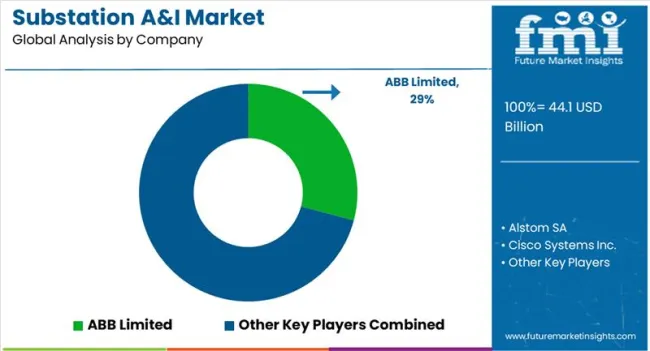
The substation automation and integration market is witnessing rapid growth as utilities and industrial sectors adopt smart grid technologies to enhance operational efficiency, reliability, and safety. Substation automation systems enable real-time monitoring, control, and protection of electrical assets, while integration solutions facilitate seamless communication between devices and control centers. ABB Limited is a major player providing advanced substation automation solutions with scalable architectures and intelligent control systems. Alstom SA delivers robust automation and integration technologies for power substations, emphasizing high reliability and interoperability. Cisco Systems Inc. contributes networking and communication solutions that support secure and efficient data exchange in automated substations.
Eaton Corporation focuses on intelligent substation solutions that combine protection, control, and monitoring, helping utilities optimize energy distribution. General Electric Co. offers digital substation technologies that enhance asset management, predictive maintenance, and operational efficiency. Schneider Electric SE offers integrated substation automation solutions, featuring advanced software platforms for real-time monitoring and analytics. Siemens AG delivers comprehensive substation automation and integration systems, combining hardware, software, and digital services to improve grid performance and reliability. Collectively, these manufacturers are driving the evolution of smart substations, offering solutions that enhance efficiency, reduce downtime, and support the modernization of electrical grids worldwide.
| Item | Value |
|---|---|
| Quantitative Units | USD 44.1 Billion |
| Offering | Hardware, Software, and Services |
| Type | Transmission substations and Distribution substations |
| Installation Type | New installations and Retrofit installations |
| End-user Industry | Utilities, Steel, Oil & gas, Mining, Transportation, and Others |
| Component | IEDs, Communication networks, and SCADA systems |
| Communication | Ethernet, Power line communication, Copper wire communication, and Optical fiber communication |
| Regions Covered | North America, Europe, Asia-Pacific, Latin America, Middle East & Africa |
| Country Covered | United States, Canada, Germany, France, United Kingdom, China, Japan, India, Brazil, South Africa |
| Key Companies Profiled | ABB Limited, Alstom SA, Cisco Systems Inc., Eaton Corporation, General Electric Co, Schneider Electric SE, and Siemens AG |
| Additional Attributes | Dollar sales vary by component, including intelligent electronic devices (IEDs), communication systems, remote terminal units (RTUs), and supervisory control and data acquisition (SCADA) systems; by technology, spanning automation software, IoT-enabled monitoring, and AI-driven analytics; by application, such as transmission, distribution, renewable integration, and industrial substations; by region, led by North America, Europe, and Asia-Pacific. Growth is driven by increasing demand for grid reliability and efficiency, rising adoption of smart grid technologies, integration of renewable energy sources, regulatory mandates for grid modernization, and advancements in IoT, AI, and real-time monitoring solutions. |
The global substation automation and integration market is estimated to be valued at USD 44.1 billion in 2025.
The market size for the substation automation and integration market is projected to reach USD 71.8 billion by 2035.
The substation automation and integration market is expected to grow at a 5.0% CAGR between 2025 and 2035.
The key product types in substation automation and integration market are hardware, software and services.
In terms of type, transmission substations segment to command 48.6% share in the substation automation and integration market in 2025.
Explore Similar Insights

Thank you!
You will receive an email from our Business Development Manager. Please be sure to check your SPAM/JUNK folder too.
Chat With
MaRIA